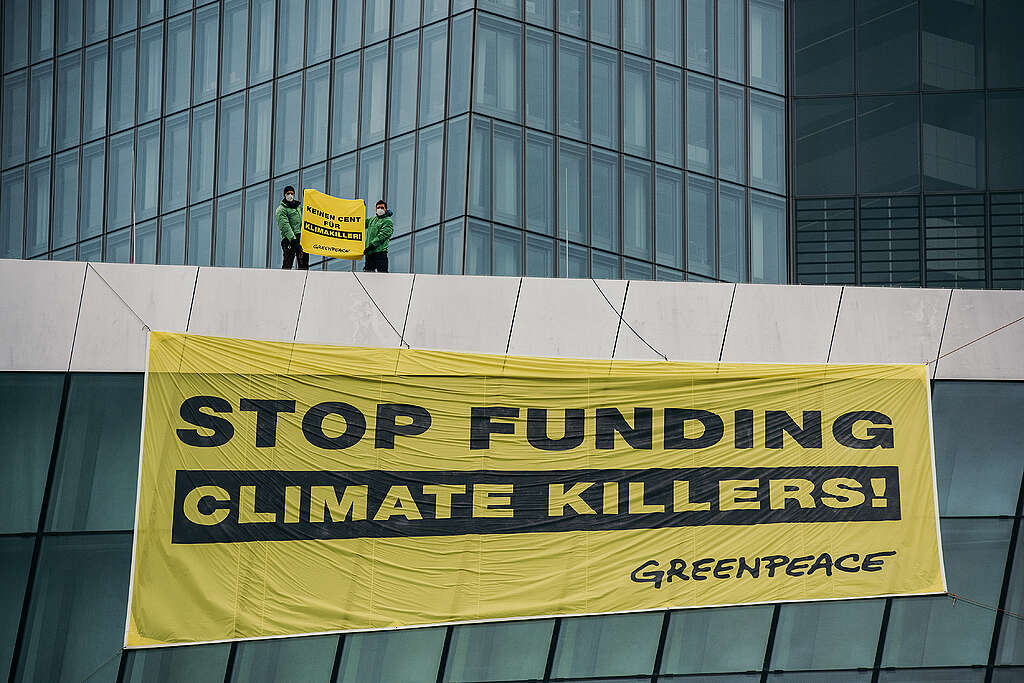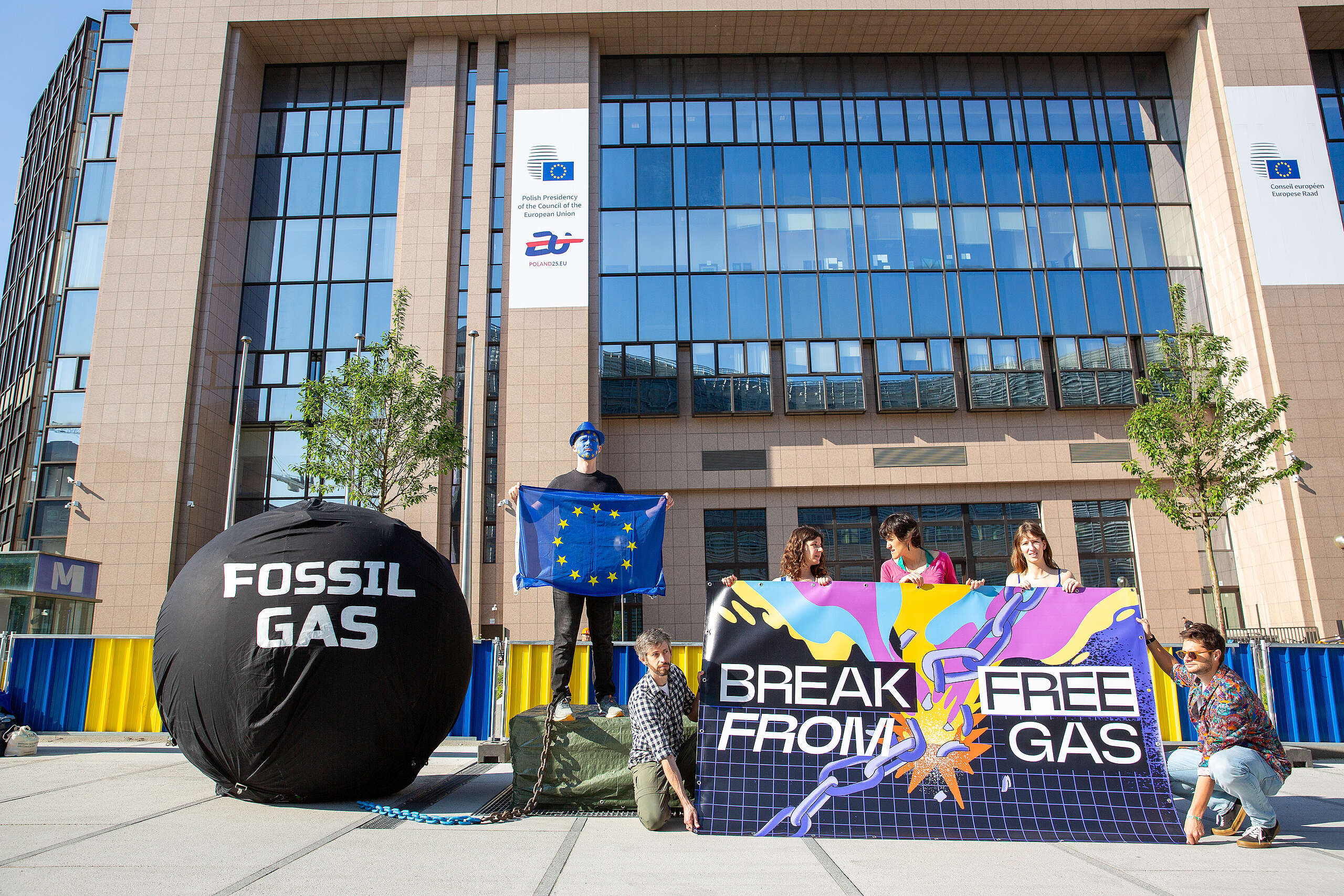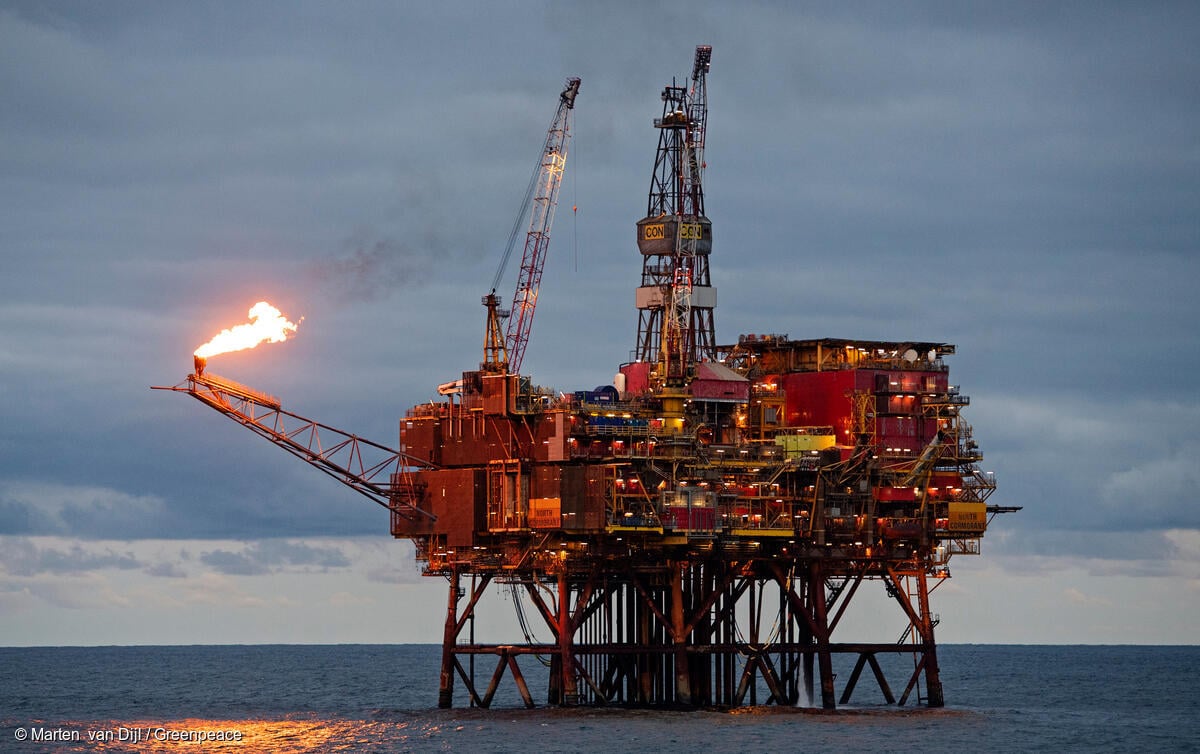
Brussels/Frankfurt, 26 July 2023 – The European Central Bank (ECB) did not meet its commitments to decarbonise its corporate bond portfolio in line with the 2015 Paris Agreement and abandoned reinvestments by the end of June 2023, failing to implement its own climate plan – a new report reveals. About 23% of the outstanding amount of green bonds bought by the ECB as part of its reinvestments have been issued by fossil fuel companies (10 bonds in total), while 10 additional bonds have been bought from other carbon-intensive companies (30% of the outstanding amount of green bonds).(1)
The research conducted by SOAS University of London, the University of Greenwich, the University of the West of England and Greenpeace Central and Eastern Europe (CEE) also shows that the ECB can and should return to a more ambitious approach that actively reshuffles its corporate bond holdings towards greener issuers, and outlines a Green Unwinding strategy to decarbonise the ECB portfolio much faster.
Greenpeace CEE finance campaigner Kuba Gogolewski said: “Across Europe, and worldwide, people and nature are struggling to live through increasing temperatures and extreme weather events. While the ECB acknowledges that climate action falls within its mandate, its decarbonisation strategy has lost steam and the Bank has failed to actively divest from climate-wrecking bonds by fossil fuels’ developers such as ENI, TotalEnergies, Shell and BP.“
Contradicting its own climate strategy, the ECB is passively unwinding its corporate bond holdings, allowing bonds to mature without being replaced. Under the current approach, and without a rapid change of strategy, there will still be bonds of both TotalEnergies and BP in the ECB corporate bond portfolio in 2040. The ECB has also acknowledged that it acquired green bonds of active fossil fuel developers such as Italian grid gas operator SNAM which, together with the Italian energy company ENI, is developing a new liquid natural gas (LNG) terminal in Italy and planning new gas pipelines.
Professor Daniela Gabor from the University of the West of England said: “In simple terms, the ECB has stepped back from actively cleaning its portfolio of dirty bonds. This must change. Our three scenarios for Green Unwinding can easily deliver the kind of active greening that both President Lagarde and Executive Board member Prof. Schnabel have recently called for.“
Given its vast holdings of 385 billion euros, any decarbonisation measures taken by the ECB could have significant impacts, affecting the cost of borrowing for oil majors and providing signals about the decarbonisation of the financial system in the Eurozone to financial markets .
Greenpeace calls on the ECB to immediately divest from bonds of fossil fuel developers such as ENI, TotalEnergies, Shell and BP and ban the possibility of buying new bonds issued by fossil fuels developers – even when they claim to be green bonds. The environmental group also encourages the ECB to develop a stricter climate scoring framework and use it to immediately sell bonds of poorly performing issuers, replacing them with bonds of companies that have a strong climate performance.
– END –
Note to Editors
(1) The report “Broken Promises: The ECB’s Widening Paris Gap” (July 2023) outlines how the ECB’s climate commitments came to an end. In July 2022, the ECB announced that it would adopt concrete measures to decarbonise its monetary policy framework. In October 2022, the ECB adopted a ‘tilting approach’ of replacing all maturing bonds with bonds from issuers with a strong climate performance. In February 2023, it announced a stronger tilting approach that would last only 5 months, prioritising bond issuers with a better climate performance. The Bank stopped this process at the end of June 2023.
Contacts
Jakub Gogolewski – Kuba – Greenpeace finance campaigner: +49 17 0765 2509, [email protected]
Mihaela Bogeljić – Central and Eastern Europe communications: +385 92 2929 265, [email protected]
Greenpeace EU press desk: +32 (0)2 274 1911, [email protected]
For breaking news and comment on EU affairs: www.twitter.com/GreenpeaceEU
Greenpeace is an independent global campaigning network that acts to change attitudes and behaviour, to protect and conserve the environment and to promote peace. We do not accept donations from governments, the EU, businesses or political parties. Greenpeace has over three million supporters, and 26 independent national and regional organisations with offices in more than 55 countries.
EU Transparency Register: 9832909575-41



